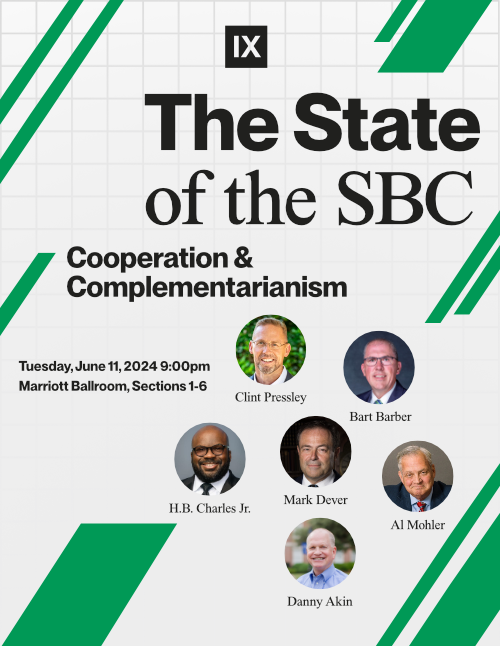Book Review: Launch, by Nelson Searcy & Kerrick Thomas
Nelson Searcy and Kerrick Thomas, Launch: Starting a New Church from Scratch. Crossway, 2019. 223 pages.
“Get off my lawn.” We’re all familiar with the grumpy, old neighbor who yells at well-meaning kids for innocently standing on his yard. I certainly don’t want this review to be one that reflects that type of tone. But as someone who has planted a church, talks and learns from other planters, and hopes to plant more churches, I am concerned about a large portion of church-planting resources. A good representation of my concerns is found in Nelson Searcy and Kerrick Thomas’ second edition church planting book, Launch: Starting a New Church from Scratch.
I didn’t pick up this book with any familiarity with the authors or their ministries. Looking at the website of their plant in New York City, they seem to be clearly aligned with the gospel of Jesus Christ. These are brothers that want to make a difference for Christ. I’m confident they have, and for that I am truly thankful.
“SUCESS AND SIGNIFICANCE”
The authors bill the book as a “tool-kit to launch a dynamic church from scratch-starting today.” In fact, Searcy says “my goal is not to provide you with theory, but rather with a proven and strategic process to take your new church from scratch to success and significance” (17). These are strong goals.
Searcy and Thomas define “success and significance” in the following way: “The goal of Launch is to help you start a church from scratch that will reach as many people as possible, as quickly as possible, in the power of the Holy Spirit” (30). I may be reading it incorrectly; however, they seem to be saying that “success and significance” are found in getting as big as possible as quickly as possible as the Spirit allows.
The authors’ foundational chapter says that “the majority of church plants fail within the first year because the majority of church planters start churches without a clear calling from God. In order to plant a successful church, you have to know that you are called by God. Period. There is no way around this truth. Thriving churches have always been-and always be-built on a base of personal calling, not personal choice” (37).
After this they move to the necessity of a strategy: “Success starts with strategy. Whether you’re hoping to grow a business, start a family, get an education, or plant a new church, the most important first step you can take is to develop a strategy. Without one, success is practically impossible” (51). The example they provide for successful strategy is Ray Kroc, the milkshake salesmen that took McDonalds to a worldwide success.
THREE CONCERNS
I have three primary concerns with this book. My first concern is how the authors define “success and significance.” They seem to emphasize that if you grow numerically large at a quick rate, you have achieved the goal. This is a crippling measure.
For instance, think of the “success” of Christ who only had 120 followers at the end of his ministry (Acts 1:15). Or, consider his promise that “few” people will enter the narrow door in comparison to the many people that will enter the door of destruction (Luke 13:22–30).
We could also consider church history where we’d find that most churches in the history of the world have developed slowly and without great size.
But, more to the point, measuring “success and significance” is a debilitating demand that has no promises attached to it. I’ve lost sleep under the weight of this demand and I’ve prayed with brothers that daily struggle under the weight of worldly standards of “success.” God gives us a thousand promises that allow us to live confidently and with great significance that don’t need the arbitrary definition of success as numbers.
A second concern I have is the equally debilitating demand for a planter to base the success of the plant upon an arbitrary “calling.” Searcy, for instance, looks to his own life as an example of calling. He was thinking about New York City and his wife happened to bring it up as well. To base the well-being of a church on a subjective call adds more unnecessary pressure to an already difficult work. Hasn’t God given us “certainty” by the provision of his word and the qualifications and evaluations therein (Luke 1:1–4, 1 Tim. 3:1–7)?
A third concern is the the authors’ occasional use of Scripture. The book only lightly uses Scripture and when it does, it normally is attempting to support a point already made. Worse still is the not uncommon misapplication Scripture. The authors point to Jeremiah’s calling (Jer. 1:5, 7–8) as evidence of the need for a personal calling to plant (41). Abraham’s calling to the land (Heb. 11:8) is used as a prescription for the need to be called to a particular place (44). Jesus’ call to count the cost of discipleship (Luke 14:28–32) is used as the basis for the need to have a strategy.
PLANTING CHURCHES ACCORDING TO GOD’S PROMISES
Scripture gives us a thousand promises to stake our lives upon for the sake of Christ and the gospel. It gives us clear prescriptions for what makes a church and who is qualified to lead those churches. We don’t need to borrow from the business world or their definitions of profit to establish criteria for success and significance. For the glory of Christ and the good of his people, plant churches that are rooted in and driven by Scripture. Let success and significance fall where they may. Planters must be faithful and courageous pastors. As we understand these things, we will enjoy the freedom and the joy of the gospel, and as a result, we will be more effective planters.








